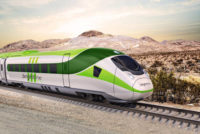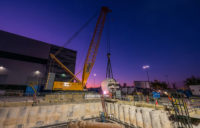Transit
Las Vegas-to-L.A. High-Speed Rail Construction Could Begin Next Year
Billionaire investor says start of the project is now at 'the one-yard line'

A rendering shows the Brightline West high-speed train station planned for the Los Angeles suburb of Rancho Cucamonga.
Image courtesy of Brightline West
A long-delayed plan to build an $8-billion high-speed train linking Los Angeles and Las Vegas is about to be spurred back to life, its developers say.
Executives with the Brightline West electric train project say construction could start next year should U.S. Dept. of Transportation regulators approve, as expected, an extension of the line to Rancho Cucamonga in suburban Los Angeles.
Federal officials say an environmental review of the extension and issuing of permits are scheduled to be complete by the end of November. This follows an agreement late last year with California that provides the rights-of-way for the train’s new leg.
“The United States has turned its attention to achieving the significant benefits of high-speed rail, including job creation, greater connectivity between communities, and emissions reductions,” says a Brightline West spokesperson who declined to be named. “Brightline looks forward to working with the Federal Railroad Administration on finalizing the permitting process.”
The company says its all-electric train, with speeds of up to 180 mph, will keep 400,000 tons of carbon dioxide out of the air each year and remove 3 million cars from Interstate 15, which sees hours-long southbound traffic jams each weekend as tourists return to Southern California from Las Vegas.
Brightline West already has approvals for construction of a 170-mile portion of the line from the more remote Victor Valley into Las Vegas, where a terminus is planned about two miles south of the Strip.
Clark County (Nev.) Commissioner Michael Naft, whose sprawling district includes the planned Las Vegas train station and extends south to the California border, says he is optimistic about the project.
“You have to credit Brightline for doing this in Florida,” says Naft, pointing out the company’s soon-to-be-completed expansion of its existing high-speed Miami-area train into Orlando.
Naft has supported the L.A. to Las Vegas train concept for a decade and says he sees the start of construction in 2023 as providing a “timely jolt” for development in Southern Nevada.
“This is jobs—good-paying jobs from engineering through construction. You can’t undervalue that with so many of our high-profile projects closing up,” he says, citing the nearly complete MSG Sphere, and the Resorts World and Circa resorts, which opened last year.
Final federal approval of the Brightline West project would allow it to seek funding through the 2021 infrastructure package, which includes money for high-speed rail. The company spokesperson says there is interest in investigating potential opportunities for federal support once the government releases specifics about the funding process.
Brightline West had earlier received approvals from California and Nevada to sell tax-favored private-activity bonds that could have been used to finance more than $4 billion of the project. The company scrapped the bond issue in early 2020, citing the pandemic and less favorable market conditions.
Plans for the train were first announced in 2004, and Brightline acquired rights to the project in 2018. Investor Richard Branson’s Virgin Trains pulled out of the deal in August 2020.
Billionaire investor Wes Edens, whose Fortress Investment Group owns Brightline, told the Las Vegas Review-Journal in late January that the start of the project is now at “the one-yard line.”
“I can’t think of a more shovel-ready project in America than this one, or a more environmentally friendly one,” Edens told the newspaper.
Brightline West says it expects to announce contractors for the project sometime later this year. The company says the project would create 40,000 construction jobs and 1,000 permanent jobs.
Separately, Edens, who co-owns the Milwaukee Bucks NBA team, is working to bring a Major League Soccer franchise to Las Vegas. There is speculation that a stadium could be built adjacent to the train station on the 110 acres that Brightline acquired south of the Strip last year.
The Brightline West spokesperson declined to comment and referred questions to Edens’ office.
Commissioner Naft says the projects “stand alone but would be complementary,” and that he “would support that site” for a stadium.



